Trusting in the Process: Revisiting Forspoken
Sometimes, the end is where it all begins

If you were to tell me there’s a gimmick in Forspoken that allows you to find and befriend the cat-like Familiars of the powerful group of rulers called the Tantas, I would have probably been more interested. I believed, because of an atrocious initial reception, that this game had few redeeming qualities: annoying banter, a nonexistent plot, a flat and uninviting world, poor polish, glitches, and, worst of all, a prickly, mean protagonist.
Forspoken is a lot of things, but “cat collector” was not what I expected to find. The ability to befriend these little helpers who collect items and mana for me as I explore eased my initial concerns about first impressions.

The game is a recent addition to the PS+ game catalogue, so I wanted to give it a shot. I found that, aside from occasional overly abrasive dialogue, the story and chatter weren’t nearly as bad as I’d expected. While flawed by rough post-production, Forspoken’s heartfelt narrative, intriguing world, and excellent combat and exploration make it a game I continue to enjoy days after completing it. Calling it imperfect as a caveat to liking it feels like a weak defense because I genuinely enjoyed Forspoken for what it was.
It has interesting combat mechanics and a lot of utility within its various toolkits. It reminds me a little of Final Fantasy XVI (or I suppose the other way around?), in that you can gain specific elemental skill trees that deal melee and/or ranged damage and grant buffs. You can customize combinations of these abilities relatively fast, allowing for reactive, twitchy gameplay. Its world is domineering and majestic, its creatures are frightening and varied, and its leading lady is kind of a blast.
But most of all, this is a game that simply blooms after you roll credits.
The Fear of Fate
Forspoken centers around Frey Holland, whose story begins with her abandonment under the Holland Tunnel (get it?). In the opening scene, we see her appealing a grand larceny charge in a public trial. This gives us a quick introduction: an orphan, a criminal, dismissive, and kind of a dick. However, after her release, we witness a softer side when she returns a phone that has fallen from someone's pocket. At the heart of this ragged, angry persona is a reluctantly soft soul. I would describe Frey as just that: a bit burdened by her empathy, barely hanging onto it. This whole journey to a fantasy world is an exploration of embracing that side of herself, rather than side-eying it as an unfortunate relic of a life that never was.
Once free of the law, thanks to the goodwill and hope of a judge sympathetic to her situation (barring one more instance of law-breaking), Frey is soon cornered by gang members to whom she owes money. After escaping, we find her in her sordid, mostly empty apartment within a condemned complex. It’s there we meet her cat, Homer, who forms the sometimes cheesy, often adorable, crux to this game’s heart. We see Frey sleep on a bare mattress on the dingy floor, that she loves Homer dearly but can’t afford the cat's preferred wet food, and she’s got a duffel of money saved up for their planned getaway.
That all goes up in flames in a scene that feels rightly emotional as Frey frantically searches for Homer through the fire. We know the gang has found her and set her apartment ablaze, and in prioritizing Homer’s safety and escaping with her, Frey abandons the hard-won money to its fate as ash.
This is all a little contrived, but it wasn’t any worse than the myriad CW shows I’d grown up watching. Here, I found myself at odds with how I expected to feel about this game. Sure, it was a little on the nose with the “save the cat” character beat, but I’d read (subjectively) worse character introductions in very popular books. We eventually see Frey relinquish Homer to the kind-hearted judge, asking her to look after the cat while she tries to figure things out.
While sitting atop the Holland Tunnel sign, the visuals imply she is contemplating ending her life, until she notices a glinting object. Here, a Jude Law-sounding, sentient vambrace, which she names Cuff, adorns her and transports her to the mythically beautiful world of Athia.
Athia is a land of sprawling structures, of ruins and dragons and lost magic, of a mutated populace, and a terrible, wasting horror. I, as the audience, am delighted. Frey, as the window we have to the world, is conversely unamused. In response to the question often posed to Isekai characters—a sort of “are you going to take this chance in a new world?”—Frey responds with an understandable “hell no.”
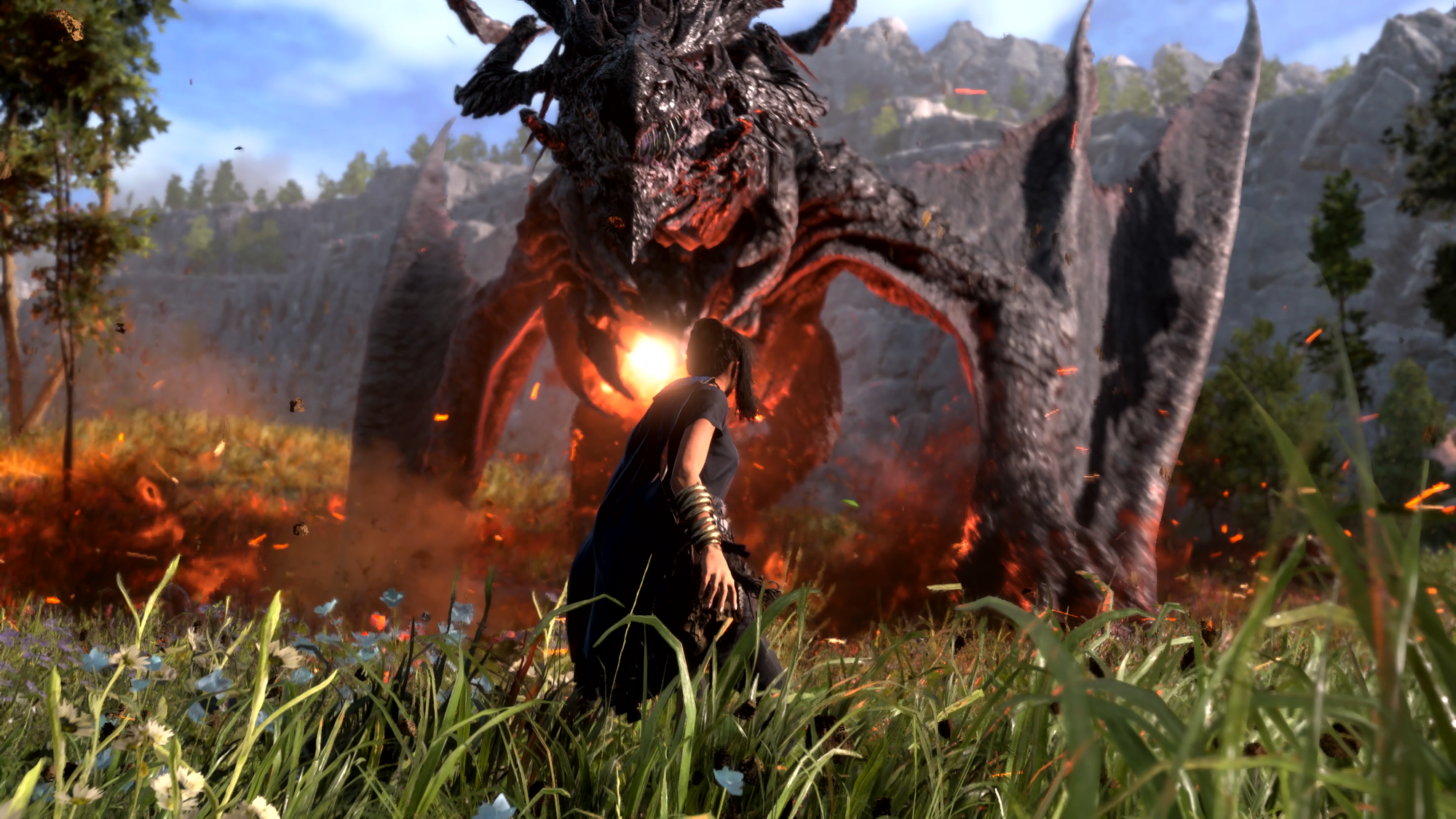
Frey's refusal to heed the call is an admittedly uncomfortable dichotomy of character and game direction, something akin to ludonarrative dissonance, but in this case, it's a deeply obvious character-narrative tension.
It’s easy to think we’d thrive in a world that isolates us from our current problems, right? But Forspoken asks us an additional question: what do we do if that new world also sucks?
Athia is plagued by a series of terrible occurrences—a ravaging world-disease that turns everything it touches into a monster (except Frey, of course), and the corruption of their once beloved quartet of magical rulers, the Tantas. Athia’s fearful and long-suffering populace quickly labels Frey both savior and demon as she wields her unfamiliar power. That same old persecution Frey has faced in New York overshadows the allure of magic; Athia’s populace sees her as both victim and menace.
Her constant whining about how tough things are has been almost intolerably annoying, but we see her start to relax in the wild. Her acerbity feels almost scripted, but beneath it lies tenderness. She wears her acidity like a carapace, and how much of it you can tolerate becomes one of the game’s key litmus tests.
Frey’s refusal to heed the call is an admittedly uncomfortable dichotomy of character and game direction, something akin to ludonarrative dissonance, but in this case, it’s a deeply obvious character-narrative tension. It is also an immensely interesting one.
I can’t think of a character more ruthlessly opposed to being in the story they’re in than Frey—and not satirically, or by way of being meta—but in genuine and blatant opposition to narrative direction. This is where I think the writing is weakest because here we have a character so averse to being in her own story that she often simply walks away from it. The game constantly has to steer her back through cataclysm or mental kidnapping, with Frey’s insistence on progressing only really manifesting in the last chapter or two. She is kicking and screaming her way to the fourth wall.
A desperate desire to return to New York and Homer motivated Frey, convinced that this would bring back her usual problems rather than force her to contend with Athia’s completely new and difficult circumstances. Frey is more than simply a reluctant hero—she’s an outright bitter one who repudiates her supposed ‘destiny’ and frames it only as an obstacle to getting home. It’s a stubbornness I tolerated even at its weariest iteration because there was always a little hope in me that Frey would finally allow herself to be part of the world. Her dogged ability to refuse that made me want to sink my teeth in deeper, because I love a good hopeless case, and boy, does she test my patience.
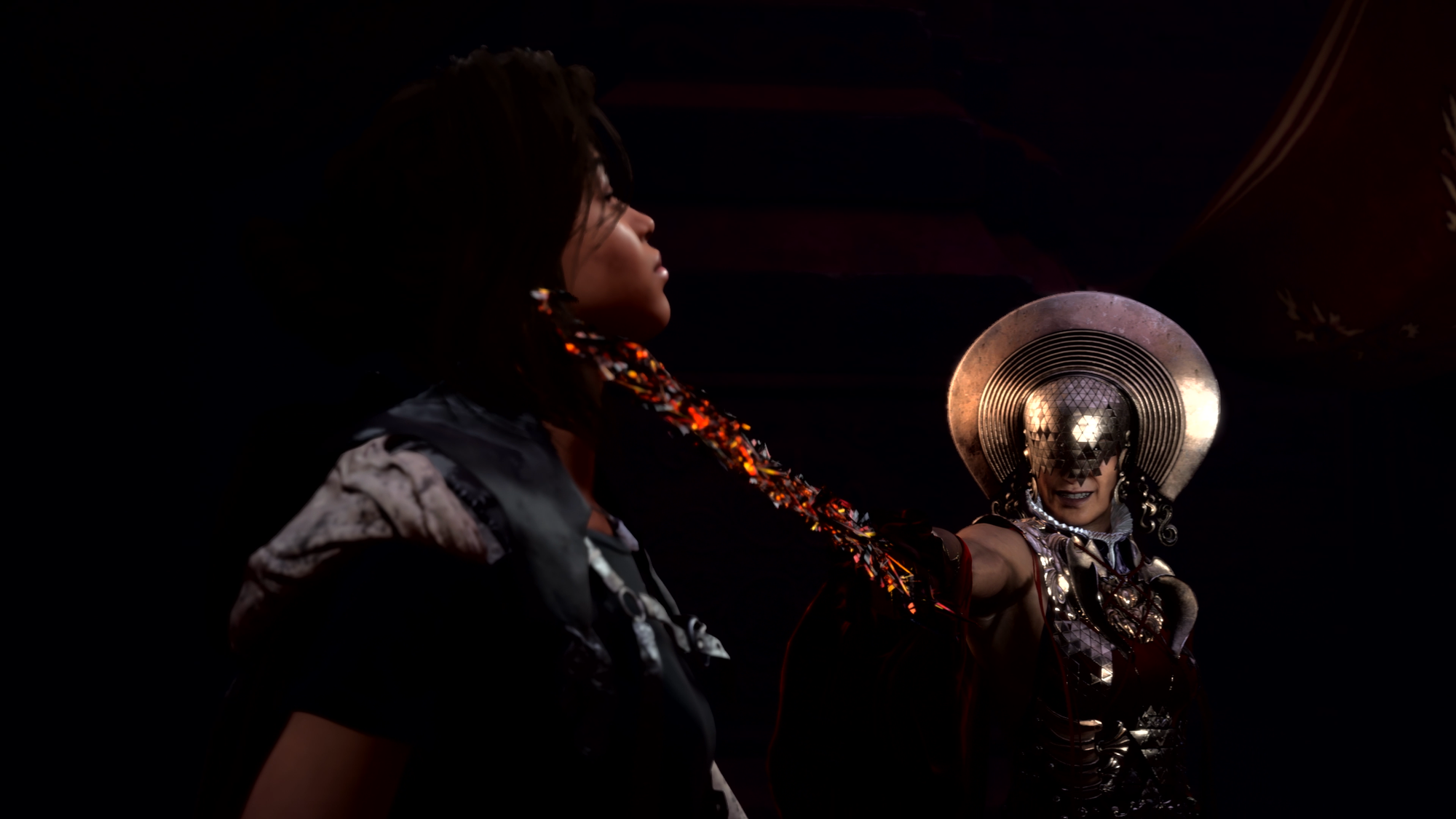
The funny thing is we don’t really see her change all that much, even as more and more tragedies transpire around her, because those same misfortunes also make her increasingly desperate to leave. I think her distance from this world is a product of her distance from everything—I don’t know these people, why should I help them? I’ve always known my troubles and I can’t solve those; how can I solve this place’s issues?
It’s funny that Frey does help them, even if the entire time she rolls her eyes about it. Most of those instances are spurred by a want to solve her own main problem, which amounts to just running in the opposite direction of whatever new issue the story has for her.
In her chance encounter with a young girl named Olevia, who ultimately dies at the hands of one of the corrupted Tantas, we catch a fleeting glimpse of a Frey who can’t stand injustice. She seeks petty revenge against the powerful sorceress, still caring for the young girl even after her death. But that glimpse fades quickly, leaving no trace behind. The problem is that Olevia’s death isn’t enough, and nothing ever seems to be. Eventually, though, you—the player—get to decide when to let it go.
I believe my affection for Frey stems from my fondness for Korra, another complex character who faced early negative reception due to her volatility. Korra, of The Legend of Korra, had a lot to live up to in the shadow of Avatar: The Last Airbender—a show almost universally considered near-perfect. Korra was never going to fill those shoes. I’m glad she didn’t. She’s obviously much more well-received in hindsight than Frey, but in Forspoken's heroine, there’s something of that wildly swinging girl mad at the world. Here’s someone everyone wants to hate, who grew up believing everyone hated her, and who thinks that being terrible to everyone won’t change things anyway, so when people—like resident healer Auden in the last Athia stronghold of Cipal—extend sympathy, it alone isn’t enough to break through her walls.
I don’t want to fall back on the idea that people, even subconsciously, tend to dislike difficult women. Frey’s problems as a character are rightfully and fairly criticized, and framing this issue explicitly as one of gender robs it of any real depth. However, I do think her snarky and rude behavior plays into an assumption I’ll call ‘bad actor allowance.’ This is the threshold to which we tolerate a character’s attitude before it becomes insufferable. I argue this bar tends to be lower for female characters than for male ones. Female characters certainly seem to hit their heads on it more often.
Obviously, you need to show how compelling you can make their anger. If it feels unearned or flat, you fail at creating a character of interesting depth. Having one trait—Frey’s being that she’s really mad about everything—isn’t palpable in the long run, because it can feel ill-conceived without development. Frey obviously has cause for her anger - she’s had a rough life - but sympathy stretches only so far for a character that simply doesn’t care. There has to be another trait. It doesn’t even need to be redeeming, just something that elevates a character from being one-dimensional to someone with a dream or something to fight for. Homer is technically the thing Frey is ‘fighting for,’ but in the face of a world on the brink of destruction, her priority of getting home to her cat—who is already safe—feels ridiculous.
That’s the point.
Frey’s bullheaded refusal to care about anything other than Homer is the rock she has to chip away at. It’s the familiar versus the unfamiliar; it’s being in a crowded room and realizing you are in the crowded room too, it’s not just full of other people. To everyone else, you are just part of the other people.
Each of these characters seem to get what Frey's on about – they labor under her arrows with a scoff and sometimes even rebuff her – and it's Frey who has to learn to trim her thorns.
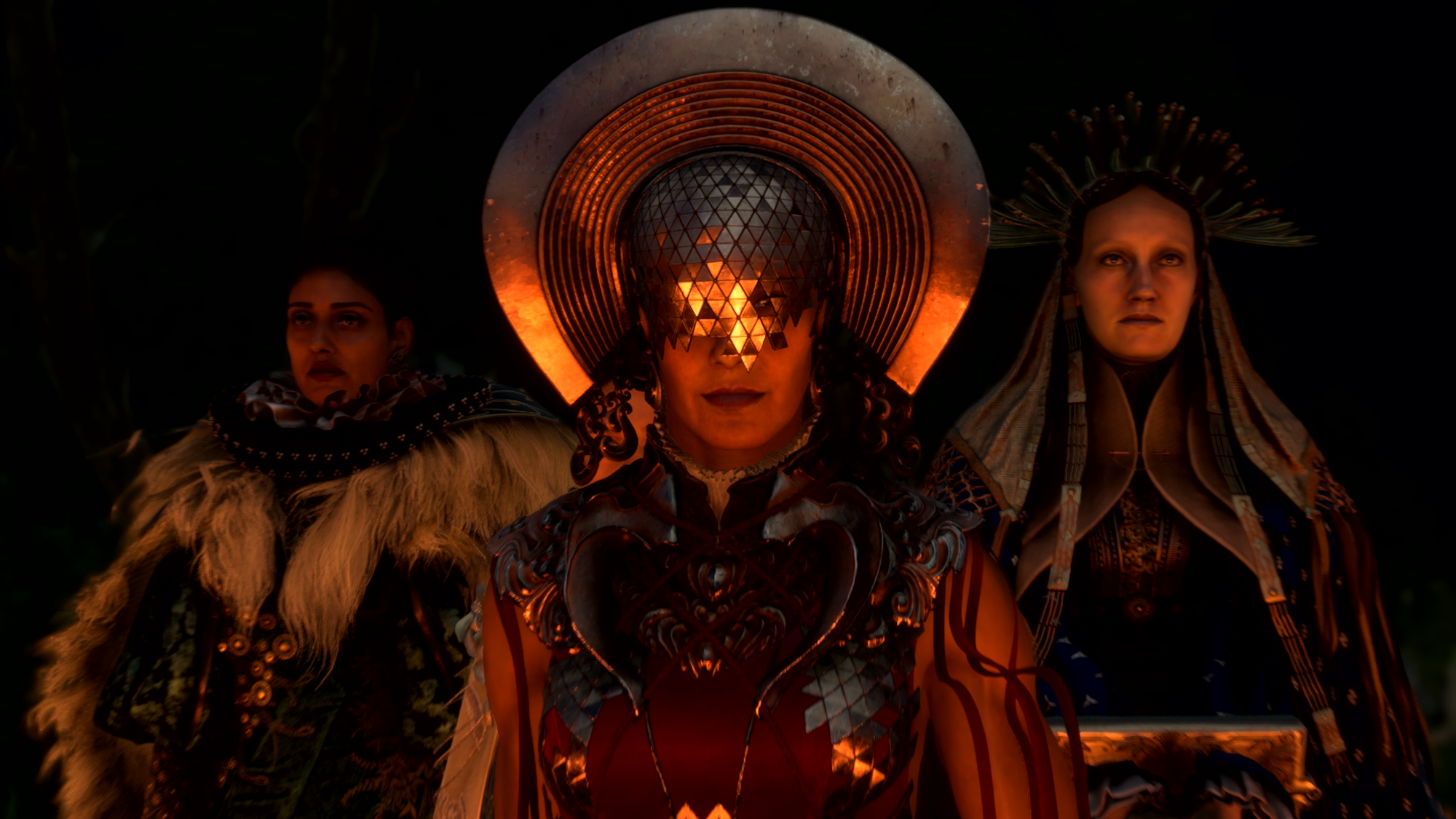
Frey is only half of the personality equation here. She’s accompanied by that sentient arm adornment, Cuff, that only she can hear. They are the duo at the core of this story. Their banter forms the snippets heard in various internet takedowns, with Frey proclaiming things like “Is that a motherf***ing dragon?” in the early hours with incredulity that feels only partly genuine.
I’ve seen very good arguments against this brand of insincerity, but I actually find the juxtaposition between fantasy-hating Frey and the fantasy world a pretty comical one. There are some laugh-out-loud funny lines of dialogue, oftentimes because of that diametric absurdity. The issue is that these two are the only company we have when we’re exploring the open world, and Cuff is essentially a disembodied voice trapped in metal.
Forspoken is a lonely game, and I think it’s what makes Frey’s outbursts all the harder to contextualize.
The Two-Man Band Problem
Forspoken’s main conflict revolves around the Tantas, four women who once ruled over Athia with grace and fairness, but who are now isolated and cruel imitations of their former selves due to a mysterious Corruption. We witness the “Break”, as Frey renames it, which is the illness sweeping across the land. When we first faceplant into this world, we’ve got only Cuff to keep us sane, but eventually, we find our way to Cipal and its cast of supporting characters. The Tantas are actually riveting enemies, and the pretty awesomely attired Council of Cipal reveal some internal political and personal turmoil as well. None of which Frey really seems to care about but I really, really do.
Forspoken suffers from this party problem throughout. In the absence of anyone Frey can really connect with, we’re bereft of shared character growth. In most JRPGs, you amass a party—a group of people you gain rapport with, who have various motivations and personalities that more deeply enmesh us in the world because of their connections to it beyond our protagonist.
Forspoken’s hook of its world is a pretty cool one, but because your investment is linear and third person, all of the larger world plot points are relegated to side characters, quests, snippets of text found in books, and refuges scattered around the realms. It limits your attachment two-fold, because you’re exploring all of this as a half-interested Frey. There are plenty of games that focus on a singular character, but Frey herself is so isolating that the philosophy of the lone wolf affects the entire game in a way that is at odds with its themes.
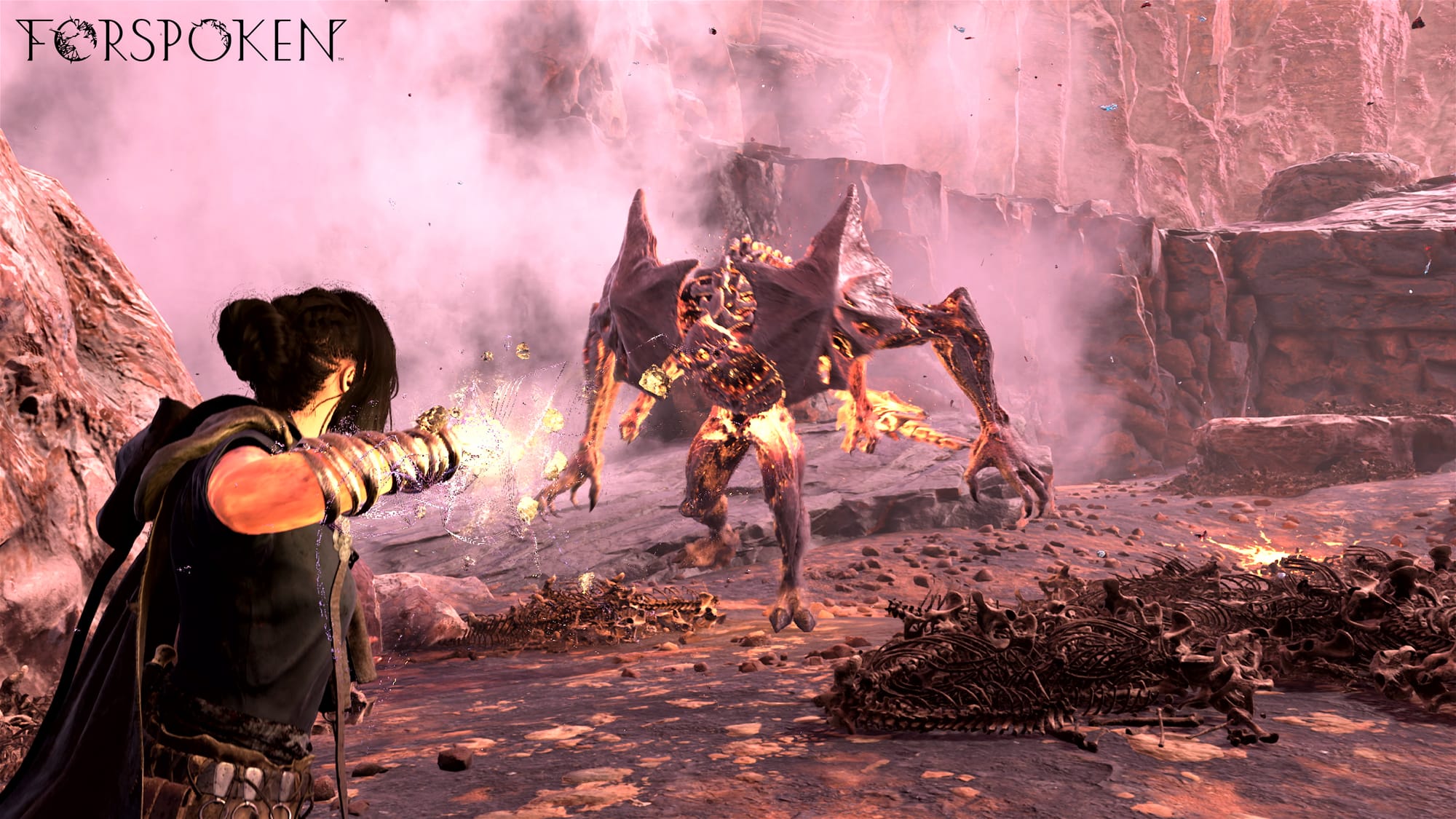
Nothing illustrates this more vividly than when you encounter Break Storms: bright blue thunderstorms that roll across the landscape, cause you passive damage, and birth frightening enemies. Frey's escape from these storms is in refuges, or safe houses, where she can shut the door on the eerie blue light and craft and sleep and watch all the cats lounging about the place. But the music is intense during these storms, changing abruptly so that it feels like an emergency to escape from. When Frey rests in these refuges, awaiting the storm's end, she curls up besides one of the Familiars. They help it feel less scary, but it still feels so viscerally lonely, because we are alone—even with Cuff snarkily commenting on our sleepiness.
Frey does gain a friend in Auden, who seems determined to temper Frey’s insistence on not giving a damn by giving a lot of damn's herself. However, even she and Frey remain, at best, reluctant acquaintances for the majority of the game. Auden’s father, Robian, a researcher, and Jo, an archivist, round out the more pivotal supporting characters. Each of these characters seems to understand what Frey is about. They labor under her barbs with a scoff, sometimes even rebuffing her, and it’s Frey who has to learn to trim her thorns. And she does! Eventually.
Really, it’s her mother who brings this full circle when it’s revealed that Frey is actually the daughter of one of the Tantas—Tanta Cinta—who sent her to New York to protect her from the Corruption slowly driving the Tantas to madness. Tanta Cinta stands in deep contrast to her daughter. She is patient, kind, soft-spoken, and loves deeply and openly. In this juxtaposition, we see not who Frey might have been had she grown up loved in Athia, but who she can model the tattered remains of her kindness after.
It’s really in her mother’s story, and that of the other Tantas, that Forspoken shines, which is a shame because it occurs near the very end of the game. It’s there, after seeing everything that brought Athia to its knees, everything her mother did for her, we’re left with a choice to make with Frey. Do we save our people? Or do we go back to New York?
And you can go back to New York—you’ll get a 20-second cutscene of a sad-looking Frey holding Homer, asking what to do now. End. This choice is the culmination of that character-narrative push and pull, in which Frey is too detached to give a damn. However, if you choose to stay in Athia to fight, you are rewarded with a glimpse once more of that caring, selfless Frey—and this time it sticks.
Opening the Door
There is a scene at the very end where Auden and Frey talk after Frey decides to stay and help Athia. In this scene, a snide remark from Frey seems to mask, for once, a much deeper affection. It’s expertly delivered as an obviously softer blow. A cuff on the shoulder. It’s a good send-off as an ending because we finally see that glimpse of caring Frey become something more permanent. Choosing Athia genuinely made me feel that, even at our most hopeless and horrible, we are still capable of choosing better. That’s a pretty awesome reminder.
Frey also makes a very long-winded speech to Homer about having hope and how she’ll always be there for her even if she can’t see her, which was hilarious because I assumed Homer—like any cat—was perfectly content at the judge’s nice apartment, cozying up on the windowsill, wet food on demand. But, of course, this is a game about a girl and her cat, so Homer looks longingly out the window at a passing shooting star symbolizing Frey before, I assume, turning to knock something adorably off a table.
Cuff is our final interesting component because for a long time he really wasn’t all that interesting. He’s protective of Frey and annoyed by her, but seems to grow a little fonder of her as time progresses, and...that’s about it. We don’t know what he is until much later, and by then we’ve seen a few hints as to what that might be.
Once again, it’s the ending here that really sealed the deal for him and Frey’s continued alliance. When we discover that Cuff is the being responsible for the Tanta’s corruption—including driving Frey’s mother mad—we are treated to a climactic boss fight between Frey and Cuff (or, er, Susurrus). At the end of the game, after his defeat, we assume his death.
...Forspoken is the rare game that really shines in the context of its finished story because it finally feels like there's a story to tell.
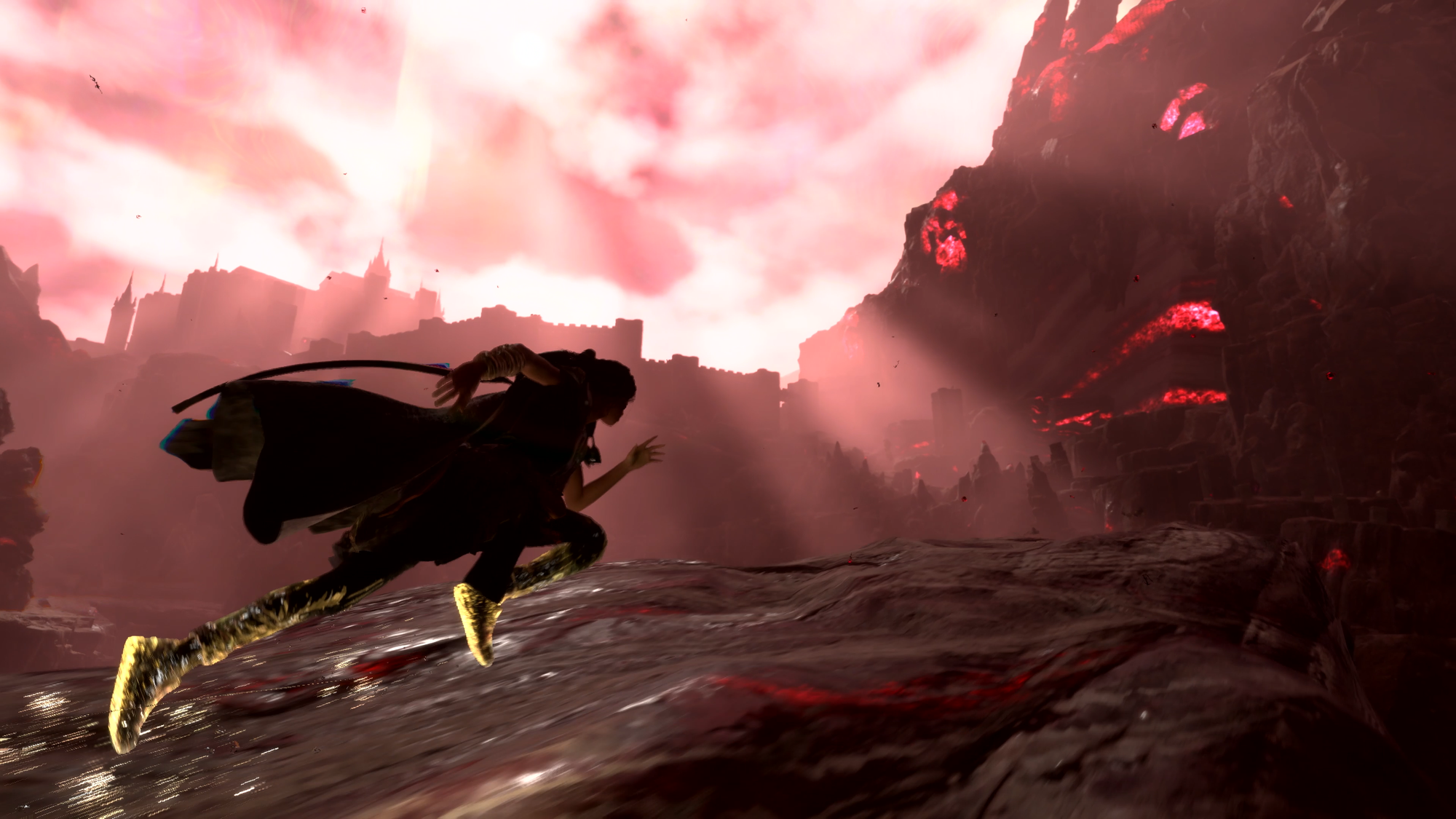
But no. Frey speaks out to him cheekily in the final scene, and we find out she’s locked him away permanently into a gold tattoo on her arm. He threatens to drive her mad as he did her mother, and at that moment I affectionately “oh, you”-ed at the story because Frey, hater of being a hero, was now warden to a demon created to kill her nation that might eventually drive her mad. It’s a sacrifice no one knows she made. Post-game they continue their little conversations in the open world, and it seems like maybe he’ll wind up not driving her up a wall, because she’s pretty much already driving him up one, and in this is a tease of what could have been all along.
The world feels richer now that you’re at home in it; your connections to the land feel greater, your joy feels genuine, and your relationships will only deepen. There is a beacon for you now. Whereas before you wandered Athia listlessly, lacking direction, lacking connections, now it feels like an adventure. With the stellar traversal mechanics and mysteries of the world waiting in the wings, Forspoken is the rare game that really shines in the context of its finished story because it finally feels like there’s a story to tell. This sounds bad—it’s a story-based game, after all—but the conclusiveness of the story means you can freely explore without the baggage of knowing there’s an ending that’s still to come.
I remember how I couldn’t bring myself to go back to the open-world portion of Final Fantasy XV once I beat it because it robbed the narrative of closure. I was too emotionally connected to the ending, and so revisiting happier times via “time travel” felt jarring and false.
Forspoken does the complete opposite. The ending cements Frey’s place in Athia and you feel like you belong here. After I beat the game, I picked right back up in my room, able to chat amicably with the denizens of Cipal, now friends and companions, and the first thing I did was dive out those front doors. The world spread out—unexplored, wild—and now I was eager to see it.
